Department of English
One of the premier Women's Institutions of Delhi University
Department of English
Faculty

Dr. Indira Prasad Bahuguna
- Associate Professor
Indira Prasad (Associate Professor) has been teaching since 1990. She is one of the editors of Individual and Society(2006) and Living Literatures (2007) which students across disciplines study in Delhi and other Universities.
Her PhD on the complete works of a Bhojpuri performance artiste, Bhikhari Thakur, is an extension of her interest in theatre. She has lectured extensively on drama in various colleges of Delhi University, apart from presenting papers at national conferences and seminars. Her other area of interest is translation. At present, she is engaged in translating Bhikhari Thakur's famous play "Bidesia" that drew attention to the life of the migrant, much before Covid 19 did.
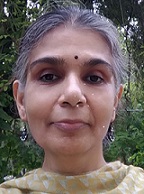
Ms. Deepika Tandon
- Associate Professor
Deepika Tandon (M.Phil, Delhi University) has taught for over 28 years. She has co-edited Revisiting Abhijnanasakuntalam: Love, Lineage and Language (Delhi: Orient Blackswan, 2011) with Saswati Sengupta. She has worked on Hindi films and modern Indian theatre, with a special focus on gender and performance. She has been active with The Ariels, the English Theatre Society of Miranda House for over sixteen years. Her extended engagement with student theatre complements her pedagogic practice and research interests.
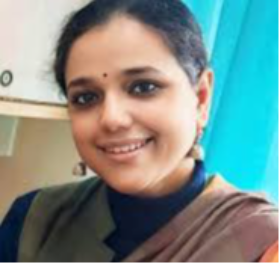
Dr. Devjani Ray
- Professor
Devjani holds a Bachelor’s Degree in English Literature from Presidency
College, Kolkata, a Masters from Delhi University, an MPhil from JNU and a PhD from the Department of Humanities and Social Sciences, IIT Delhi. During her doctoral studies, she was awarded the Charles Wallace Trust grant for research in the UK 2015. Her doctoral thesis is on Bengali children’s periodicals in the late nineteenth and early twentieth century.
Her interests lie in childhood studies and its intersections with other cultural projects, particularly critical literacy, pedagogy and nationalism. Her work has appeared in several journals.
She also writes extensively for newspapers and news websites.
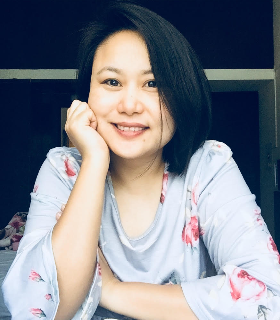
Dr. Senganglu Thaimei
- Associate Professor
Dr. Senganglu Thaimei has a PhD on the Oral Tradition of the Rongmei from the University of Delhi. She is a Fulbright scholar and did her postdoctoral research on proverbs studies in the University of Vermont, USA. She is currently a Fellow in The Highland Institute, Kohima. Her area of expertise is Folklore with specialisation in Paremiology. She had worked in The Centre for Academic Translation and Archiving, Delhi University on projects that involved archiving of oral materials from the Northeastern states of India. She has presented papers in national and international conferences notably in American Folklore Society and Western States Folklore conferences in Minneapolis, Baltimore, Tulsa, and Las Vegas in the USA. She has lectured in University of Vermont, USA, and been an invited speaker in several universities within India. she has contributed essays and chapters in various folklore journals and edited books.
Dr. Thaimei curated rare books written in Rongmei language, and the collection was exhibited In CATA, Delhi University in 2017. She also directed and wrote for a documentary film called, Gaan-Ngai: The Festival of the Rongmei Nagas in 2017.
She is a visual artist and a published illustrator. Her Illustrations are featured in Easterine Kire's fictions Songry (2021), and Journey of the Stone (2021), and Milinda Bannerjee's and Jelle P. Wouter's Subaltern Studies 2.0 (2022). Her books include "Birds, Beasts, and Blooms: An Illustrated International Book of Proverbs"(2024), "Ape Ndelam Ming Mi?: Where has Grandma Gone?" (2024), and the latest being "A Critical Companion to Easterine Kire's Sky is My Father: A Naga Village Remembered" (2025), co-edited with Dr. Veio Pou.
Dr. Thaimei co-founded MARII BOOKS - a venture that publishes children's books in tribal languages spoken in northeast India and their English translations to encourage tribal children to read in their mother tongue. She is a member of Art for Change Foundation India.
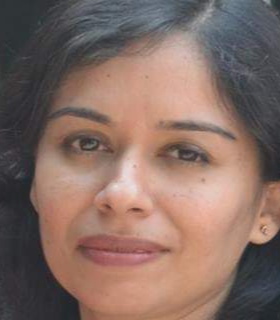
Ms. Meera Sagar
- Associate Professor
Meera Sagar joined the Department of English at Miranda House in 2006. Her areas of interest include 20th century poetry, theory of music and literary translation. She has contributed to Revisiting Abhijñānaśākuntalam: Love, Lineage and Language in Kālidāsa’s Nāṭaka (Orient Blackswan, 2011). Her poems have been published in journals such as The Four Quarters Magazine, Muse India and Best Indian Poetry.
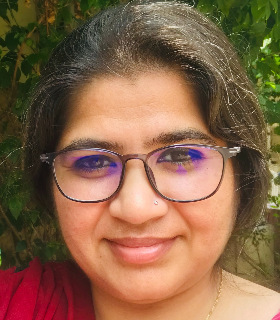
Dr. Parul Bhardwaj
- Associate Professor
Parul Bhardwaj is an associate professor. She has a PhD in Literature from the University of Mumbai, on the topic Partition Narratives: Researching History in the Mirror of Fiction. She specializes in Partition and Postcolonial Literatures in English, Urdu, and Hindi. She also has a Post Graduate Diploma in Applied Linguistics from SNDT Women’s University, Mumbai, and an Advanced Diploma in the Urdu language from the University of Mumbai. Her other areas of academic interest are pre-colonial literatures in Urdu and Hindi, Mainstream Indian Cinema, Translation Studies, Drama and Theatre.
She has studied several languages and writes in both English and Hindi. Her articles have been published in English, Hindi and Urdu literary journals. She has contributed a chapter to the book Revisiting Abhijnansakuntalam: Love, Lineage and Language in Kalidasa’s Natak published by Orient Black Swan Pvt. Ltd. New Delhi. She has presented papers at several national and international conferences and seminars.
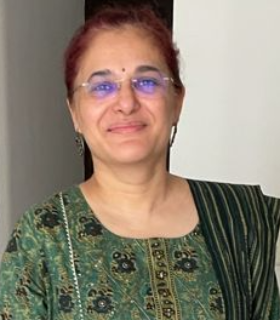
Shweta Sachdeva Jha
- Associate Professor
Shweta Sachdeva Jha has been teaching at the Department of English at Miranda House since December 2008. She did her BA, MA and MPhil in English from Lady Shri Ram College for Women, University of Delhi. She completed her PhD as a Felix Scholar at the School of Oriental and African Studies, University of London. Her research areas include history of the tawa’if, genre fiction in Urdu, digital history, children's picture books, visual culture and crime fiction. Her research has been published in peer reviewed journals and as book chapters in edited volumes by reputed national and international publishers. She has completed research projects on Children’s Picture Books in India, (Delhi University Innovations Grant 2015-16) and Punjabi Christian Women and the Partition (Tata Trusts-Partition Archive Research Grant 2021). She continues to lead the Miranda House Archiving Project (Initial seed grant by Dr. Avabai Wadia Archive Fellowship, Centre for Women’s studies, SNDT University, 2020). Her recent work includes writing open access, curatorial essays on digital history, gender and feminist themes supported by arts organisations and fellowships such as the Curationist Fellows Program (March -August 2024), Writing Initiatives, Serendipityarts.org (06 October 2022). For a detailed list of publications, presentations and link to these essays see her profile on: https://sites.google.com/mirandahouse.ac.in/shwetasachdevajha/home
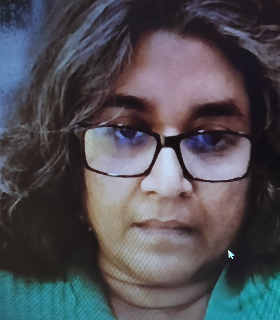
Dr. Jenny Rowena P
- Assistant Professor
Did her doctoral research on caste and gender issues in popular Malayalam cinema. Has brought out a book in Malayalam on Masculinities in Malayalam cinema. Other research interests include caste, gender, Indian modernity and secularism. Has taught papers on Literature and Caste, Literary Theory, Popular Literature (Bhimayana), Women's Writing, Romanticism, etc.
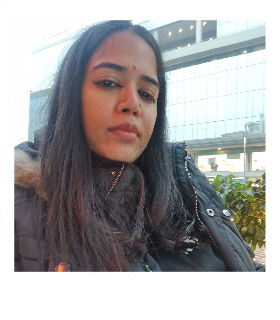
Ms. Gorvika Rao
- Assistant Professor
Gorvika Rao is an Assistant Professor with more than ten years of experience in UG-PG (Undergraduate-Postgraduate) teaching. She wandered in DU & JNU and survived till her M.Phil. Her current areas of interest are Comic/Graphic, Caste, Films and Archive Studies. She believes in exploring new areas in interdisciplinary studies and gets easily bored with institutional canons. She is an avid binger of Netflix and comics. Her passion for films made her convenor of ‘Celluloid'- Miranda House Film Society, which she hasn’t let go from the last seven years. Under her guidance, Celluloid has won several awards in film-making competitions, started their Annual Film/Film-making festival ‘Chalchitra’ and released its first student’s journal “Chalchitra Darpan”. Her love for graphic novels led her to actively participate in the introduction of a new course on graphic narratives in the Delhi University undergraduate curriculum. She loves to travel and read. To satiate her desire to travel and fulfil some of the mandatory requirements for existing in academia, she has also presented national and international papers in Guwahati, Scotland, Warwick and the Philippines. Presently, she is also part of the Miranda House Archiving Team and works with Dr Shweta Sachdeva Jha in creating content for social media. She received grants from Wikipedia and Project Mukti in 2019. She is the recipient of AAA grant of 2023-24 and has been working on her project to understand Ambedkraite Delhi through Dalit Little magazines.
For know more about her in a standardized format visit :
https://in.linkedin.com/in/gorvika-rao-78321a16a
https://du-in.academia.edu/gorvikarao
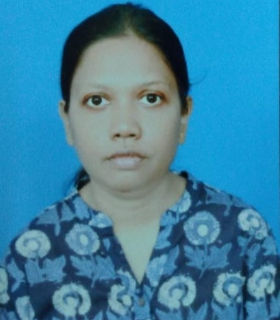
Dr. Anshu Kujur
- Assistant Professor
Anshu Kujur has done her undergraduate studies from University of Delhi and her MA and Phd from Jawaharlal Nehru University. Her Phd was on Indo-Jewish wwritings which continues to interest her. She also has a Diploma in English Journalism from IIMC, New Delhi. Her areas of research inerest include Diasporic Literature, Life Narratives, Indian English Writings and Writings from Chotanagpur Tribal communities. She has presented papers in National Conferences. Apart from academic research, she is also interested in exploring writings from her community and savouring good food.

Pratyaksha
- Assistant Professor (Guest)

Simran Bhagat
- Assistant Professor (Guest)

NAVYA CHOUDHARY
- Assistant Professor (Guest)

Ms. Mishail Sharma
- Guest Faculty
Mishail Sharma is an Assistant Professor (Guest) at Miranda House, University of Delhi, in the Department of English. She earned her bachelor's degree from the University of Delhi, her master's degree from Jamia Millia Islamia in New Delhi, and her Master in Philosophy from Panjab University in Chandigarh. Her MPhil dissertation focused on Indian Popular Fiction, Postcolonial Studies, and Cultural Studies, and it looked at the complicated relationship between identity in flux and shifting socio-cultural and political dynamics in urban India. She has attended national and international conferences and workshops. She was a participant in two MHRD-sponsored SPARC research projects hosted at Jamia Millia Islamia, titled
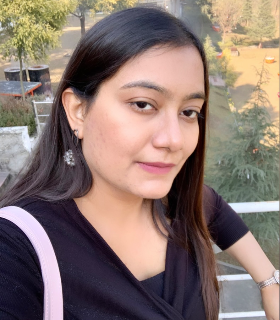
Ms. Somya Tyagi
- Guest Faculty
Somya Tyagi is an Assistant Professor (Guest) in the Department of English, Miranda House. She holds an MA in English Literature from Hindu College and has completed her M.Phil from the Department of English, Delhi University with distinction. She is currently pursuing Ph.D from Delhi University (on Theodor Adorno’s Social Psychology) under the supervision of Prof. Shormishtha Panja and Prof. Subarno Chattarji. Her areas of interest include Critical Theory, Modernism, Affect, Literary Theory, Indian Literature, and Popular Fiction. She has presented papers at national and international conferences, and has published several research papers in academic journals including her recent publications titled 'Reclaiming the Disabled Post-Colonial Subject - Narratives of Oppression, Resistance and Transformative Praxis’ in Oxford University Press and 'Reconciling Tradition and Modernity in Vijay Tendulkar’s Ghashiram Kotwal' in Muse India. Somya was awarded as the college topper in BA (Hons) English, Delhi University (2010-2013). She has taught a diverse range of courses at IGNOU and Delhi University, including Diaspora Studies, British Literature, Comparative Literature and Linguistics.
https://du-in.academia.edu/SomyaTyagi

Subashinee Rajkumari
- Assistant Professor Guest
Nidhi Singh
- Assistant Professor (Guest)

Ngahneithem Haokip
- Assistant Professor (Guest)
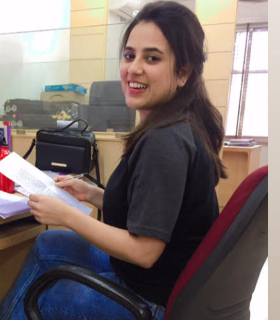
Amrapali Sharma
- Assistant Professor (Guest)
Currently pursuing PhD at the Department of English, University of Delhi, Amrapali Sharma has been teaching at the Department of English, Miranda House since April 2022. She holds a bachelor's and a master's degree in English Literature from University of Delhi. She has also worked as Associate Editor at Primus Books, Delhi. Her research interests include the transformation of a bio-medical 'ancien regime' in the early eighteenth century, with special reference to quarantine legislation. She has some publications in the area and has presented papers at national/international conferences. With an editorial experience of over five years, she is also interested in practices of academic book production and the protocols of scholarly writing.
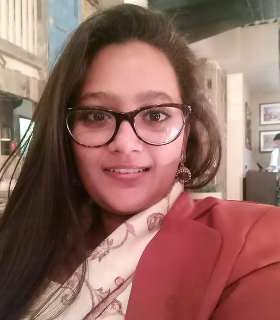
Mridul Kiku
- Assistant Professor (Guest)

Sumeet Tanwar
- Assistant Professor
Mr. Harshit Nigam
- Assistant Professor Ad-hoc
Harshit Nigam is associated with Miranda House since 2019. He is also a doctoral candidate at the Department of English, University of Delhi, investigating the contemporary cinematic representations of the Partition(s) of the Indian subcontinent. His broad research areas are South Asian Cinema(s), Film Stardom, Discourses on Gandhi, and Caste. His teaching interests comprises – British Romanticism, Modernism, Literary Theory, Film Studies, Indian Literature(s), Gender, Popular Culture etc. Harshit loves to write verse and his poems have been published across the three continents.
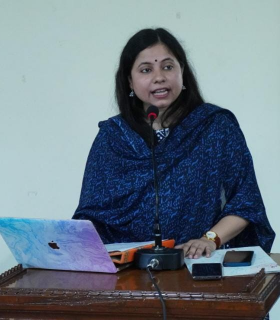
Abhabya Ratnam
- Assistant Professor
Abhabya Ratnam has been teaching at the Department of English, Miranda House, University of Delhi since August 2023. Her expertise lies in Mythological Studies, Indian Classical Literature, Indian English Literatures, Women’s Writings, Gender Studies etc. With a career spanning over 6 years, her research interests include Mythological Studies, Indian Classical Literature, Indian English Literatures. She has authored scholarly papers in reputed journals and has mentored numerous students pursuing literature at UG and PG level. She has been the convenor of the English Literary Society, the English Debating Society, and Suvakta (the MUN Club) at Miranda House. She is also a member of the College Magazine Comittee and a staff advisor to the Indian Dance Society, Mridang. As a dedicated academic, she continues to contribute to the field with her insightful analyses and innovative teaching methodologies. She also holds a Prabhakar degree in Kathak dance.
Connect with her at:
https://in.linkedin.com/in/abhabya-ratnam-347a66203
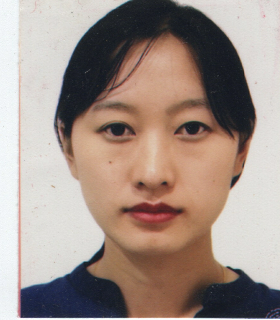
Dr. Kevilenuo Tepa
- Assistant Professor
Kevilenuo Tepa joined the department in 2023. She had earlier taught in the department from 2015-2017 as an Assistant Professor on Ad-hoc basis. She holds a Ph.D degree from Jawaharlal Nehru University, New Delhi. She completed her Undergraduate from University of Delhi and pursued her Masters and M. Phil from Jawaharlal Nehru University, New Delhi. Her area of research ranges from Indian Writings in English, Post-colonial Literature, Literature from the Northeast of India, Women's Writings especially of the autobiographical kind, folk and oral literature etc. Before joining the department she worked as an Assistant Professor in P.G.D.A.V College, University of Delhi and as Assistant Professor in DODL, Dibrugarh University. She has been regularly contributing to book chapters and various academic journals of repute, including 'Indian Literature' by Sahitya Akademi.
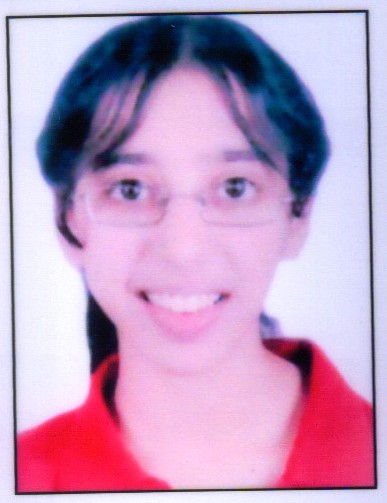
Nishita Khattar
- Assistant Professor
Nishita Khattar joined the Department of English at Miranda House in August 2023. She holds an undergraduate degree in English Literature from Hindu College and a Masters degree from St. Stephen’s College. Her MPhil, pursued at the Department of English, University of Delhi, was on the intersections between poetry and music in the corpus of the German poet-philosopher, Friedrich Hölderlin. She is currently pursuing her doctoral research at the department on Emily Dickinson’s poetry and its encounters with the sublime. Her interests traverse the terrains of Romanticism(s), modernism(s), literary criticism and theory, and European classical literature. Prior to her appointment at Miranda House, she had taught for two years at St. Stephen’s College, University of Delhi. She has delivered courses canvassing the territories mentioned above, as well as papers on British poetry and drama across several centuries, literature and mediality, culture and theory, bestsellers and genre fiction, cinematic adaptations of literary texts, and the individual and society. Her work has been published in reputed journals.





 Unique Essay Competition
Unique Essay Competition